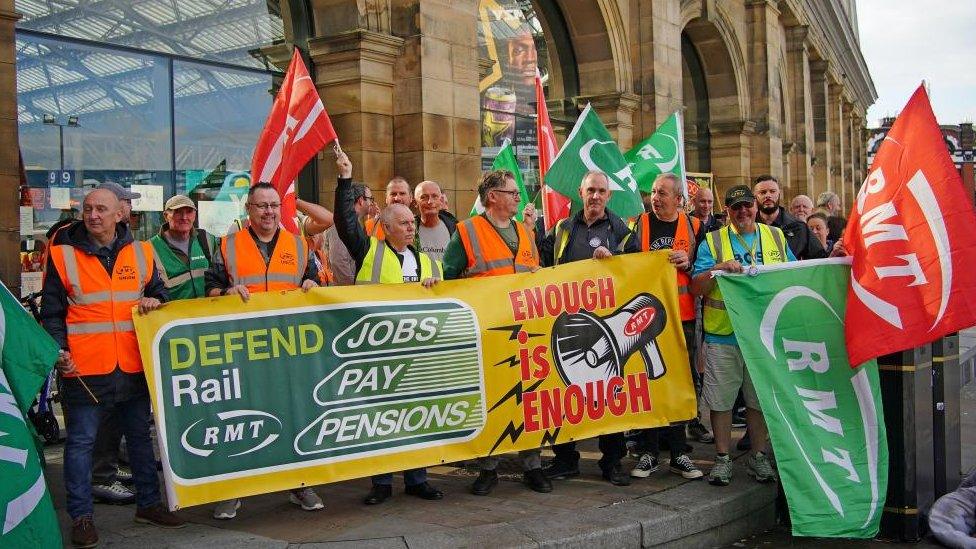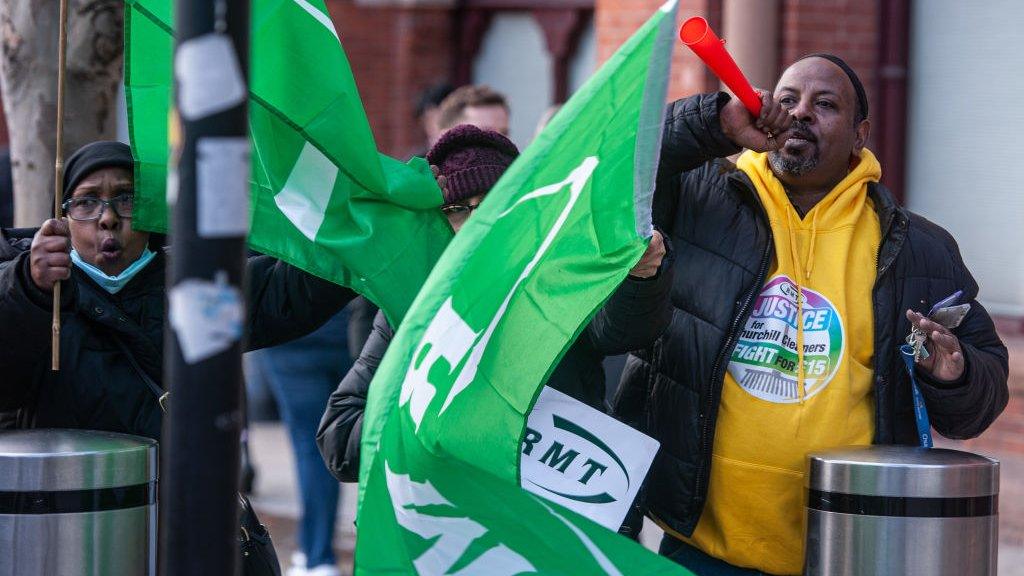Train strikes: Travellers facing disruption as rail workers walk out
- Published

Workers join a picket line outside Liverpool Lime Street station
Train passengers faced another day of disruption as up to 20,000 rail workers from the RMT union walked out for the second Saturday in a row.
It is part of a long-running dispute about pay, jobs and working conditions.
About half of the usual services were expected to run across the network, and some to finish earlier than usual.
The RMT said it was waiting to be invited back to the negotiating table. The government said the union should put an existing offer to RMT members.
The strikes came as travellers faced long waits at times at the Port of Dover, where there were delays of up to two-and-a-half hours on Saturday.
By the evening almost 30,000 people had made their way through the port, en route to France, with queues peaking before lunchtime. However by the early evening the queues had been resolved.
At 18:00, officials said traffic was "free-flowing in the port" with no delays.
Natalie Elphicke, MP for Dover and Deal, described the day as "challenging" for port traffic, and said delays had been hampered by the fact many travellers changed their plans at short notice "due to "the continental heatwave.
Separately the train strike affected passengers at at London's Euston railway station, where some travellers told the BBC they had some sympathy for rail workers, as others spoke of their frustration as they tried to make alternative plans.
The operators affected are based in England, but some run services into Wales and Scotland. They include:
Avanti West Coast
C2C
Chiltern Railways
CrossCountry
East Midlands Railway
GTR, which operates Southern, Thameslink, Great Northern and Gatwick Express
Great Western Railway
Greater Anglia, which includes Stansted Express
LNER
Northern Trains
Southeastern
South Western Railway
TransPennine Express
West Midlands Trains
Elsewhere, motorway traffic was temporarily blocked after a herd of cows wandered onto the M6 near Stoke on Trent.
National Highways said traffic had begun flowing again, but with 45-minute delays both ways, after the herd moved away.
It said it was monitoring the cows' whereabouts and that Staffordshire Police was "working to advise the farmer to ensure the cows are secured".
Trade 'falls of cliff' in strikes
Kate Nicholls, from the trade body UK Hospitality, said trade "falls off a cliff" in towns and city centres across the UK every day there is a rail strike.
She estimated that around £340m worth of sales in the UK had been lost over the past week during three strike days and a drivers' overtime ban.
Saturday's action is the last strike in the diary and unions have to give at least 14 days' notice of any further strike action.
However, next week Aslef, the train drivers' union, has an overtime ban scheduled, which will also affect services.
Asked when the industrial action was going to end, the RMT's general secretary Mick Lynch said: "We don't know. We've got a government who won't negotiate."
He told BBC's Breakfast show that workers had not had a pay rise for four years, but that the more pressing issue was job cuts.
"They've given me statutory notices for 2,300 of our members leaving the industry. They are then going to move on to catering and engineering and other workers in the industry so the immediate thing is job security," he said.
"When we've concluded those things, we would like a pay rise that addresses the cost of living crisis," he said, but declined to put a figure on it. "There are a lot of issues to deal with but they can be resolved fairly sensibly if they come to the table with good will."
Josh Coe, from the Rail Delivery Group, which represents the 14 affected train companies, said: "We've been negotiating with the leaders of the RMT now for over a year and it's a real shame that the offer we made to them worth 13% in terms of an increase in pay for the lowest paid is not being put to their membership which would have brought this industrial dispute to an end."
A Department for Transport spokesperson said: "The government has met the rail unions, listened to them and facilitated improved offers on pay and reform.
"The union leaders should put these fair and reasonable offers to their members so this dispute can be resolved."
The RMT's senior assistant general secretary Eddie Dempsey said this morning that the union had already held a "mass consultation" with its members on the offer, "and they gave us their view which was that they wanted to reject the offer and see an improvement".
The union was therefore "not going to put an offer to our members that we've already rejected", he said.
If nothing changes, the RMT could schedule more strikes until November, when it would have to re-ballot members.
The average salary of rail workers in 2022 was £45,919, according to the Office for National Statistics (ONS).
Excluding drivers - who tend to be members of the Aslef union, not RMT - its estimate is £39,518.
However, the RMT union said that figure was too high because it did not include rail cleaning staff.

How will the rail strikes affect your journey? What alternative forms of transport are you using? Share your experiences by emailing haveyoursay@bbc.co.uk, external.
Please include a contact number if you are willing to speak to a BBC journalist. You can also get in touch in the following ways:
WhatsApp: +44 7756 165803
Tweet: @BBC_HaveYourSay, external
Please read our terms & conditions and privacy policy
If you are reading this page and can't see the form you will need to visit the mobile version of the BBC website to submit your question or comment or you can email us at HaveYourSay@bbc.co.uk, external. Please include your name, age and location with any submission.
Related topics
- Published9 May 2024

- Published7 December 2022
